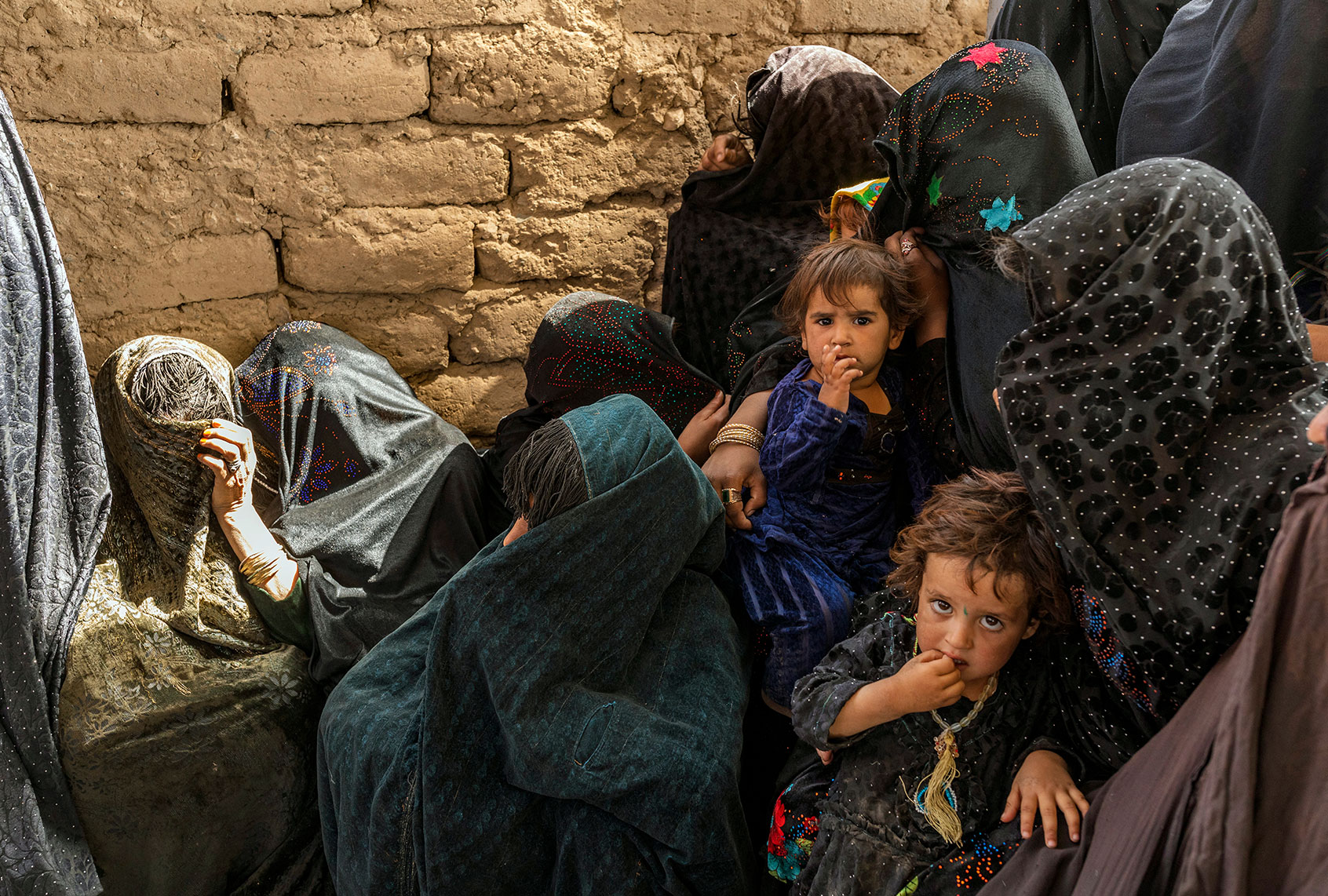As the United States withdrew militarily from Afghanistan in August, U.S. TV news interest in the plight of the country’s citizens spiked, often focusing on “the horror awaiting women and girls” (CNN Situation Room, 8/16/21) to argue against withdrawal (FAIR.org, 8/23/21).
Four months later, as those same citizens have been plunged into a humanitarian crisis — due in no small part to U.S. sanctions — where is the outrage?

UN News (10/25/21) quoted the head of the World Food Programme: “Afghanistan is now among the world’s worst humanitarian crises — if not the worst — and food security has all but collapsed.”
Experts warned of an impending humanitarian crisis in the wake of the U.S. withdrawal (IRC, 8/20/21). In recent months, the messages have become more urgent. A UN report (10/25/21) warned that “combined shocks of drought, conflict, Covid-19 and an economic crisis in Afghanistan have left more than half the population facing a record level of acute hunger.” One million children are so malnourished they are at risk of dying in the coming months (IRC, 12/3/21).
RELATED: Empire of chickenhawks: Why America’s chaotic departure from Afghanistan was actually perfect
Decades of conflict, invasion and occupation left Afghanistan with a highly precarious economy. In 2019, well before withdrawal, a record 50% of Afghans reported finding it “very difficult” to get by on their household income (Gallup, 9/23/21). While drought and the COVID-19 pandemic have contributed to the current humanitarian crisis, it is largely driven by the imploding economy. The entire banking system is collapsing, with government employees going unpaid and citizens unable to access their money or receive funds from relatives abroad.
As many have pointed out, the Taliban shoulder some blame, having banned women from most paid jobs outside of teaching and health care, costing the economy up to 5% of its GDP (UNDP, 12/1/21). But a much bigger driver of the crisis has been the U.S.-led sanctions on the Taliban. The U.S. occupation left Afghanistan dependent on aid for 40% of its GDP and 80% of its budget. After withdrawal, the U.S. froze some $9 billion of the country’s central bank reserves, and U.S. and UN sanctions cut off the central bank from the international banking system and drastically limited the aid flowing into the country (UNDP, 12/2/21).
Want a daily wrap-up of all the news and commentary Salon has to offer? Subscribe to our morning newsletter, Crash Course.
Despite pleas from around the globe, even, most recently, from former U.S. military commanders in Afghanistan and dozens of members of Congress (Washington Post, 12/20/21), the Biden administration has made only slight tweaks to its policies, which are ostensibly meant to punish and provide leverage over the Taliban, but, like other supposedly targeted sanctions, have the effect of putting millions of civilian lives in peril.
Vanishing interest
Since Nov. 1, well into the worsening crisis, FAIR has identified only 37 TV news segments from ABC, CBS, NBC, CNN, Fox and MSNBC that mentioned “humanitarian” in the same sentence as Afghanistan. That’s 37 segments in seven weeks.
For perspective, as the U.S. withdrew in August, journalists from those shows mentioned “women’s rights” in the same sentence as Afghanistan more often — 42 times — in just seven days. Today, as those women and girls face starvation, the deeply concerned TV reporters are virtually nowhere to be seen.
Even when reports did mention the crisis, they rarely highlighted the U.S. role. Of the 37 mentions, FAIR was able to find only four that named sanctions as a factor.
MSNBC twice (11/23/21, 12/16/21) brought on spokespeople from the International Rescue Committee to discuss the crisis, and CBS did so once (12/12/21); all three of these guests named the role sanctions play in Afghanistan’s economic collapse.

“One Million Children at Risk of Dying of Starvation” was the secondary point of ABC’s report (12/15/21); the main focus of the story was “Taliban Authority Being Challenged by ISIS Terrorists.”
ABC World News Tonight’s Ian Pannell (12/15/21), in a report from Afghanistan, made the only other mention of sanctions, in a vague and brief reference that named no names: “A mix of sanctions and drought has brought the country to the brink of catastrophe.” After showing an emaciated two-year-old and telling the child’s mother, “You must feel very hopeless, very helpless,” Pannell wrapped up his report by noting:
$280 million in emergency aid has been OKed by the United States and others, but it’s likely not enough. It won’t reach hungry mouths until the end of the year. And the situation right now in Afghanistan seems as bad as I can remember it in 20 years of reporting here.
With no mention of what was causing the crisis, or what kind of help was actually needed, Pannell’s report had the effect of painting the U.S. as a benevolent actor that just wasn’t doing quite enough to address a largely inevitable situation. The segment and its top-of-the-show preview were the only two mentions FAIR’s study found of Afghanistan’s humanitarian crisis on ABC during the study period.
More often, the crisis was covered with a brief soundbite that emphasized women’s rights over the broader humanitarian crisis, as on CNN Newsroom (11/28/21):
A group of female Afghan students graduated from a private university in Kandahar on Saturday. They were forced to wear veils, due to a rule imposed by the Taliban. Before the Taliban takeover, an estimated 100,000 girls were attending universities. The graduates fear finding jobs might be difficult, because of both the Taliban rule and the country’s worsening humanitarian crisis.
Finding jobs is also difficult when a powerful enemy has frozen the funds of your nation’s central bank — but that’s not the kind of problem U.S. corporate media is likely to dwell on.
More on the 20-year war in Afghanistan, and America’s ugly exit:

